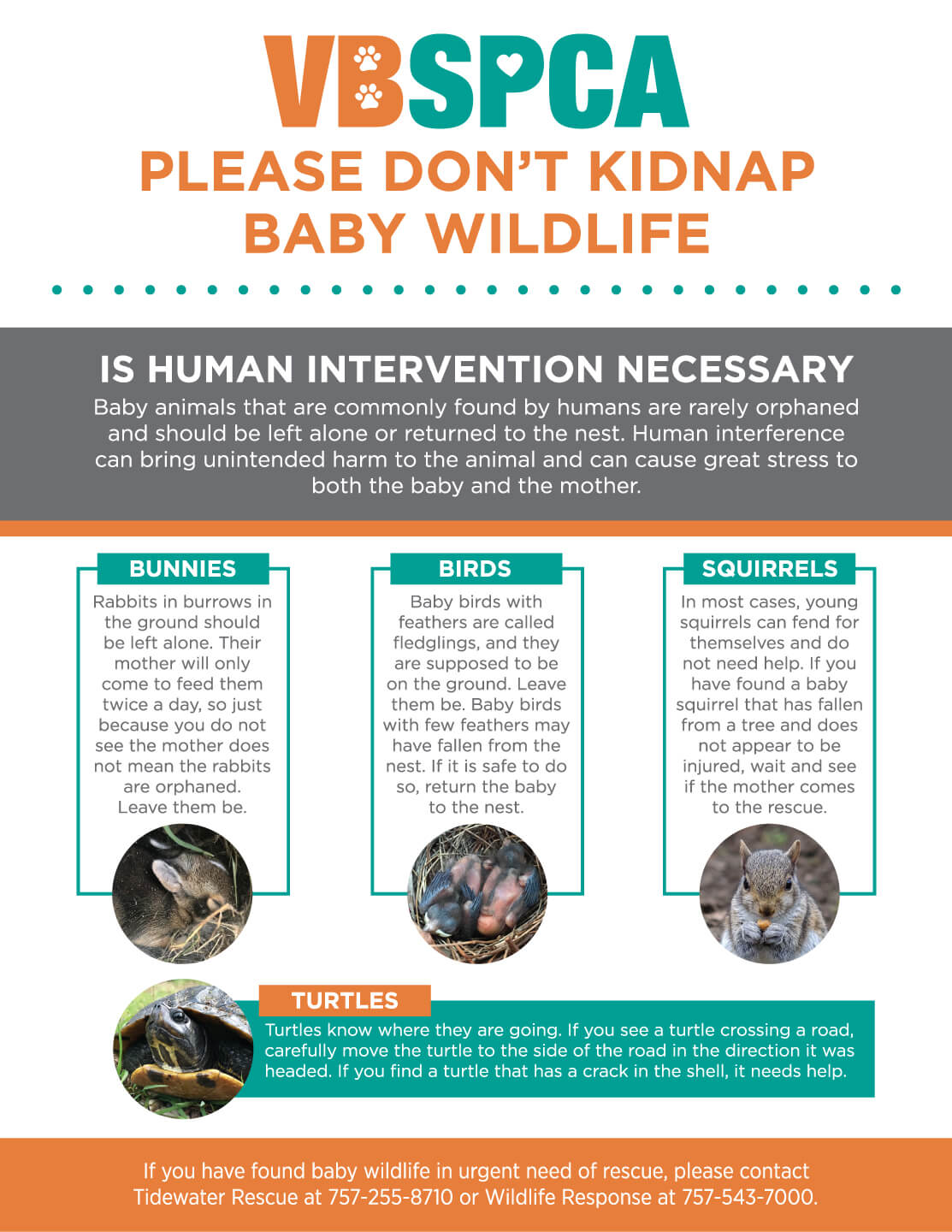Spring is particularly busy for the Virginia Beach SPCA as we see baby wildlife being brought to the shelter under the assumption that they have been orphaned. This is often not the case, and it is of critical importance that humans know when wildlife actually needs our help and when it does not. Just because you see a baby creature alone in the wild does not mean it has been abandoned or orphaned. In these situations, human interference can bring unintended harm to the animal and can cause great stress to both the animal and the mother. Below are a few species commonly found in our area along with information to help you identify the best course of action should you come across them in the wild.
Baby Bunnies
Rabbits in burrows in the ground should be left alone. Their mother will only come to feed them twice a day, so just because you do not see the mother does not mean the rabbits are orphaned. Please leave them be.
Baby Birds
Baby birds with feathers that are hopping on the ground are called fledglings, and they are supposed to be on the ground and they are learning how to live. Leave them alone. Baby birds with few feathers may have fallen from the nest. If it is safe to do so, return the baby to the nest.
Squirrels
In most cases, young squirrels do not need help. They are independent at 10-12 weeks and can fend for themselves. If you have found a baby squirrel that has fallen from a tree and does not appear to be injured, keep your pets away from the baby and wait and see if the mother comes to the rescue. The ultimate goal is keep the squirrel with the mother in the environment it was born in.
Turtles
Turtles know where they are going. If you see a turtle crossing the road and is in danger, you may carefully move the turtle to the side of the road in the direction it was headed. It doesn’t need help beyond safely crossing the road. However, if you find a turtle in the road that has a crack in the shell, it needs help.
When help is needed:
The exception to the above is when you come across injured wildlife. It is the mission of the Virginia Beach SPCA to eliminate animal suffering, and our wildlife program is an extension of that. We provide triage services to injured wildlife only, and any wildlife that can be rehabilitated is transferred to a permitted rehabilitator in the community. If you have found injured wildlife that is actively bleeding or wounded or has been in the mouth of a cat or dog, please safely place wildlife in a carrier or shoebox and bring it to the Virginia Beach SPCA during regular operating hours. Please ensure that wildlife is safely secured in a lined box or carrier and do not provide wildlife with food or water. For more information, click here.
If you have found orphaned wildlife that is NOT injured, please contact your local rehabilitator. A full list can be found here. If you have found wildlife in need of rescue, call Tidewater Rescue at 757-255-8710 or Wildlife Response at 757-543-7000.


Last Updated: May 19, 2025 by vbspcaadmin
Wildlife – Is Human Intervention Necessary?
Spring is particularly busy for the Virginia Beach SPCA as we see baby wildlife being brought to the shelter under the assumption that they have been orphaned. This is often not the case, and it is of critical importance that humans know when wildlife actually needs our help and when it does not. Just because you see a baby creature alone in the wild does not mean it has been abandoned or orphaned. In these situations, human interference can bring unintended harm to the animal and can cause great stress to both the animal and the mother. Below are a few species commonly found in our area along with information to help you identify the best course of action should you come across them in the wild.
Baby Bunnies
Rabbits in burrows in the ground should be left alone. Their mother will only come to feed them twice a day, so just because you do not see the mother does not mean the rabbits are orphaned. Please leave them be.
Baby Birds
Baby birds with feathers that are hopping on the ground are called fledglings, and they are supposed to be on the ground and they are learning how to live. Leave them alone. Baby birds with few feathers may have fallen from the nest. If it is safe to do so, return the baby to the nest.
Squirrels
In most cases, young squirrels do not need help. They are independent at 10-12 weeks and can fend for themselves. If you have found a baby squirrel that has fallen from a tree and does not appear to be injured, keep your pets away from the baby and wait and see if the mother comes to the rescue. The ultimate goal is keep the squirrel with the mother in the environment it was born in.
Turtles
Turtles know where they are going. If you see a turtle crossing the road and is in danger, you may carefully move the turtle to the side of the road in the direction it was headed. It doesn’t need help beyond safely crossing the road. However, if you find a turtle in the road that has a crack in the shell, it needs help.
When help is needed:
The exception to the above is when you come across injured wildlife. It is the mission of the Virginia Beach SPCA to eliminate animal suffering, and our wildlife program is an extension of that. We provide triage services to injured wildlife only, and any wildlife that can be rehabilitated is transferred to a permitted rehabilitator in the community. If you have found injured wildlife that is actively bleeding or wounded or has been in the mouth of a cat or dog, please safely place wildlife in a carrier or shoebox and bring it to the Virginia Beach SPCA during regular operating hours. Please ensure that wildlife is safely secured in a lined box or carrier and do not provide wildlife with food or water. For more information, click here.
If you have found orphaned wildlife that is NOT injured, please contact your local rehabilitator. A full list can be found here. If you have found wildlife in need of rescue, call Tidewater Rescue at 757-255-8710 or Wildlife Response at 757-543-7000.
Category: VBSPCA News Tags: orphaned wildlife, Wildlife
Search
Recent Posts
Topics